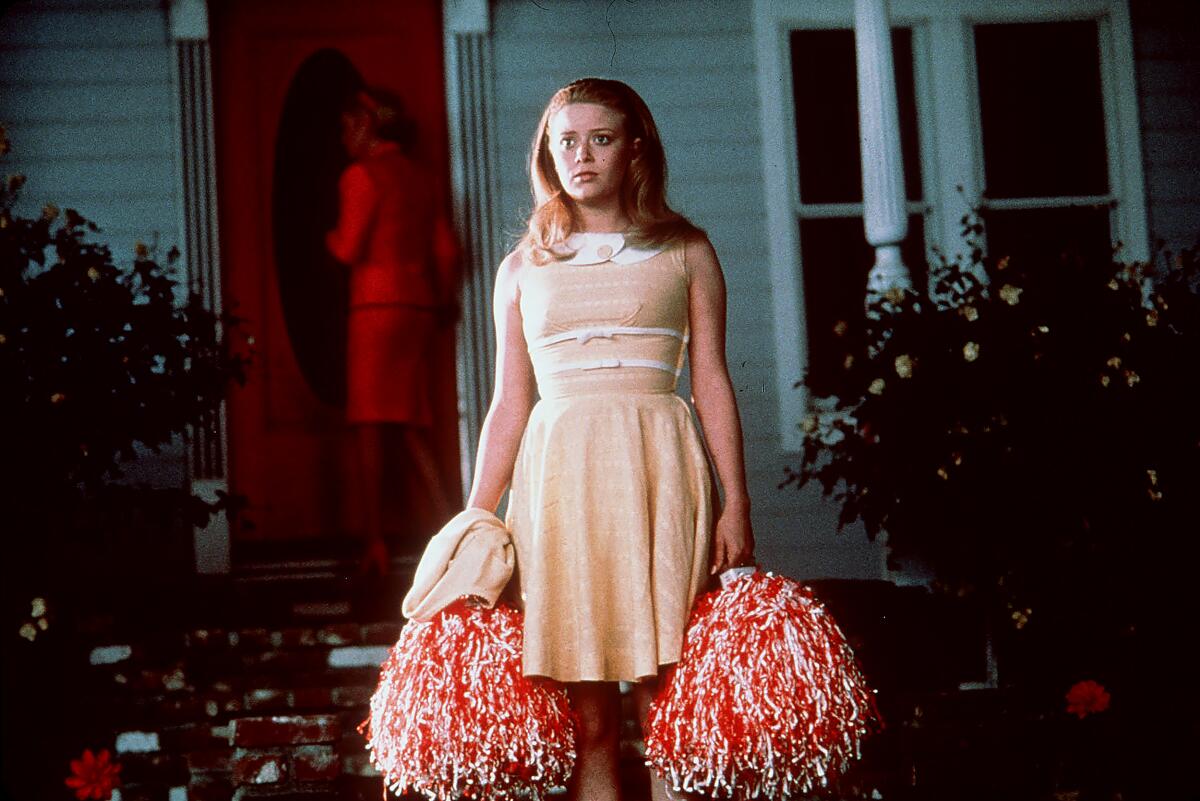Last weekend saw a slew of awards shows, with SAGs, the PGAs and the Spirit Awards all happening. With both SAG and PGA giving their top prizes to “Oppenheimer,” it is looking more and more like this year’s race for best picture is sewn up, with the question being not whether it will win, but just how many Oscars the film will take home.
In one of the season’s few awards shows that did not feature some variation of a showdown between “Oppenheimer,” “Barbie,” “The Holdovers” and “Poor Things,” the Spirit Awards gave their top prize on Sunday to “Past Lives,” also recognizing the film’s director, Celine Song.
Host Aidy Bryant called the show “the bisexual Oscars” in her opening monologue and was leading through an affably charming affair when, about 40 minutes in, a loud noise could be heard from outside the tent near the beach in Santa Monica where the event was being held. A small group of protesters had turned on a loudspeaker and a looped chant of “Free, free Palestine,” “Long live Palestine” and “Cease-fire now” that would be heard throughout the rest of the show. It added an edge of discomfort and uncertainty to the awards, as presenters and winners navigated how to address something that was very obviously happening, piercing the cozy beach hangout vibes.
As it turned out, one of the protesters was a previous Spirit Award winner, Merawi Gerima, who, in 2021, took the John Cassavetes prize for a film made for under a $1 million with “Residue.”
I spoke to Gerima on the phone Monday evening. Asked whether he thought the action had been a success, he said, “The ultimate message was that there’s no business as usual while there’s a genocide going on. Sometimes Hollywood acts as if it’s just a bubble, that nothing else is going on outside in the world. It plays that role of normalizing the things that are going on in the world.
“And if you look at the awkwardness that it created, I think that it was an important disruption,” Gerima said.
‘Beau Travail’ at the Egyptian

(The Criterion Collection)
Claire Denis’ epic of male intimacy, 1999’s “Beau Travail,” will play tonight at the Egyptian. The film’s sense of space and ritual takes on a stately grandeur when seen in a theater, making this a special event. Loosely based on Herman Melville’s “Billy Budd,” the movie takes place in East Africa, as a small group of French soldiers go about the routines of their training while an officer (Denis Lavant) becomes fixated on a new recruit (Gregoire Colin). The film builds in intensity toward one of the greatest musical numbers of contemporary movies, Lavant’s ecstatic solo dance to Corona’s “Rhythm of the Night.”
As Justin Chang wrote about the film in 2019, “Denis is a great director, but she’s also a mood. And the viewer coming to her work for the first time will be forgiven for feeling thrown a little off balance. A certain wooziness is the only sane response to ‘Beau Travail,’ her stunning film about a group of French Foreign Legion soldiers stationed in Djibouti. A daringly free-form interpretation of ‘Billy Budd’ that displaces the dense tangle of Herman Melville’s words into a succession of ravishing images, the movie is predicated on an extraordinary tension between formal austerity and rapturous sensuality.”
In his original review of the film from 2000, Kevin Thomas noted, “All sorts of meanings could be read into ‘Beau Travail,’ but the one thing Denis, whose childhood was in French colonial Africa, makes clear is that there doesn’t seem much point to the legionnaires’ sweaty regimen, a source of amusement to the locals. There’s not an ounce of body fat among the entirety of the young legionnaires, and Denis does celebrate the physical perfection of the young men as they exercise. (They do their ironing with the same precision, to amusing effect.) ‘Beau Travail’ is a work of deliberate and subversive sensuality that suggests a hollowness to all this furious activity. You sense that it’s being performed in the name of an imperial grandeur that has passed.”
Justin also wrote a streaming guide on where to find many of Denis’ films online.
Other points of interest
‘But I’m a Cheerleader’

Natasha Lyonne stars in “But I’m A Cheerleader,” directed by Jamie Babbit.
(Mark Lipson / Lions Gate Films)
Jamie Babbit’s 1999 “But I’m a Cheerleader” is one of those movies that has grown so far beyond what one might have expected of it — an indie that has gone on to have a huge effect and a devoted following. The story concerns a teenager (Natasha Lyonne, in one of her key early roles) who is sent to a gay-conversion therapy camp by her conservative parents. There, she learns to truly accept herself. The cast also features Clea DuVall, Melanie Lynskey, Bud Cort, Mink Stole, RuPaul, Cathy Moriarty and Michelle Williams.
The film has a sense of stylization that was unusual for low-budget films of the moment, creating a disorienting world of pink. (Which may also be why the film was recently given loving homage in the video for Muna’s song “Silk Chiffon,” directed by Ally Pankiw.) As luck would have it, “Cheerleader” is playing at two different venues Saturday, first at Vidiots with Babbit in attendance for a Q&A, and then at midnight at the New Beverly.
Peter Medak tribute

Gary Oldman and Lena Olin in scene from the 1993 film “Romeo Is Bleeding.”
(Polygram / Getty Images)
The American Cinematheque is launching a tribute series to the Hungarian British filmmaker Peter Medak. He’ll be present for Q&As along with screenings of his 1980 horror film “The Changeling,” starring George C. Scott, as well as a double bill of 1978’s “The Odd Job” and 1972’s “The Ruling Class,” starring Peter O’Toole.
Other films in the series include his debut, 1968’s “Negatives” and a trio of 1990s-era crime films, 1991’s “Let Him Have It,” 1990’s “The Krays” and 1993’s “Romeo Is Bleeding,” which features sizzling performances by Lena Olin and Gary Oldman.
In his original review of “Romeo Is Bleeding,” Peter Rainer wrote, “Olin, who worked extensively with Ingmar Bergman, has been extraordinary in American movies before this — most notably in ‘Enemies, a Love Story’ — but she’s never been this rip-roaringly full of guile and bile. She’s a great demented creation who uses her entire body as a sexual armament. She’s so dangerous she’s funny, with the sexiest low-slung voice since Bacall’s heyday. But Olin manages to make her funniness scary too. (She’s a real performer here, not just a parodist.)”
‘Foxfire’ and ‘The Outsiders’

Jenny Shimizu, left, and Angelina Jolie in the movie “Foxfire.”
(Jane O’Neal / Rysher Entertainment)
The New Beverly will play two teens-in-trouble movies on Wednesday and Thursday — a double bill of Francis Ford Coppola’s 1983 “The Outsiders” and Annette Haywood-Carter’s 1996 “Foxfire.” Haywood-Carter is scheduled to appear both nights to introduce her film.
Adapted from a novel by Joyce Carol Oates, “Foxfire” is the story of a group of teenage girls in Portland, Ore., who fall under the sway of a mysterious drifter as they fight against a teacher who has been sexually harassing them. The drifter, known as Legs, is played by Angelina Jolie in one of her earliest starring roles.
In his original review of the film, Jack Matthews wrote, “Jolie’s Legs Sadovsky seems inspired by James Dean’s Jim in ‘Rebel Without a Cause,’ and that’s the way she is introduced to us, as an outsider whose attempts to hide her pain and vulnerability make her seem many times tougher than she is. … A drifter for the ‘90s, lost but unafraid. It took a lot of hogwash to develop this character, but Jolie, Jon Voight’s knockout daughter, has the presence to overcome the stereotype.”
“The Outsiders” is Coppola’s adaptation of S.E. Hinton’s wildly popular novel about teenagers growing up in Oklahoma. The film, of course, has an astonishing young cast, with C. Thomas Howell, Matt Dillon, Ralph Macchio, Patrick Swayze, Rob Lowe, Diane Lane, Emilio Estevez and Tom Cruise.
In Sheila Benson’s original review of “The Outsiders,” she wrote of Coppola, “He has all but banished adults from the film, the better to let us see the world through the eyes of his bruised kids. But he’s taken on the book’s emotional timbre without tackling its basic story problems: purple prose, romanticized dialogue (unlikely to have come from any real kid’s mouth) and wild leaps of plot.”
Also in the news
Julio Torres and ‘Problemista’ Carolina Miranda spoke to writer-director-star Julio Torres about “Problemista,” his debut feature. In this tender yet surreal fable, Torres plays an aspiring toy designer struggling to navigate the U.S. immigration system when he takes a job as an assistant to an eccentric woman (an inspired Tilda Swinton). Reviewing for The Times, Joshua Rothkopf calls the film “deliriously weird yet relatable.”
Torres first came to fame as a writer on “Saturday Night Live,” then co-created and starred in the HBO series “Los Espookys.” On making the leap to directing a feature film, Torres said, “The beautiful thing about directing for me is that it sort of comes full circle and it connects the dots with my visual interests, my spatial interests and humor and writing and story writing and world-building. Something really clicked there.”
Billie Eilish and the Oscars
Just before the recent Academy Awards nominees luncheon, I had a chance to sit down with Billie Eilish and her brother Finneas for the Envelope podcast. The duo are nominated for their “Barbie” song “What Was I made For.” They talked about how movies influence their songwriting, with Finneas often encouraging Billie to watch certain movies to catch the vibe: titles such as “Drive,” “I Origins,” “The Social Network,” “Ex Machina,” “Fruitvale Station” and “We Need to Talk About Kevin.”
If Eilish wins, she would be the youngest person ever to have two Academy Awards. I asked what people could potentially expect from her performance of the song at the Oscars, and she replied, “Well, simple and sweet? I don’t know. I don’t want to ever be in anybody’s face, but I want to be the voice of whoever is quiet in the corner. Hopefully I can translate for people who don’t want to speak up. I don’t know. Simple, easy.”
It was also revealed this week that Ryan Gosling will indeed sing “I’m Just Ken” from “Barbie” at the Oscars.
The Latinx prestige projects of Lux Films For De Los, Fidel Martinez spoke to Sergio Lira and Lynette Coll, the co-CEOs of Lux Films, a media company with a focus on Latinx projects. Their first title, “In the Summers,” won the grand jury prize at Sundance this year, while the film’s writer-director, Alessandra Lacorazza Samudio, became the first Latina to win the festival’s directing prize. The film is still without U.S. distribution.
“I never wanted to be the Latino programming person, but the way the system works has put me in a position where if I don’t fight for these projects, no one else will,” said Lira.
